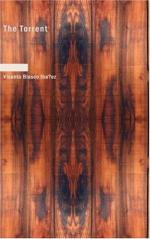How long had they been walking through the streets of Valencia?... His legs were sagging under him! He was faint with weariness. He could hardly see. The gables of the houses were still tipped with sunlight, yet he seemed to be groping about in a deep night.
“I’m thirsty, don Andres. Let’s go in somewhere.”
The old man headed him toward the Cafe de Espana, his favorite resort. He selected the table in the center of the big square salon under the four clocks supported by the angel of Fame. The walls were covered with great mirrors that opened up fantastic perspectives in the dingy room where the gilded ornaments were blackened by the smoke and a crepuscular light filtered in through the lofty skylight as into a sombre crypt.
Rafael drank, without realizing just what his glass contained—a poison, it felt like, that froze his heart. Don Andres sat looking at the writing articles on the marble table: a letter-case of wrinkled oil-cloth, and a grimy ink-well. He began to rap upon them with the holder of the public pen—rusty and with the points bent—an instrument of torture well fitted for a hand committed to despair!
“We have just an hour to catch our train! Come, Rafael, be a man! There’s still time! Come, let’s get out of this mess we’re in!”
And he held out the pen, though he had not said a word about writing to anybody.
“I can’t, don Andres. I’m a gentleman. I’ve given my word; and I will not go back upon it, come what may!”
The old man smiled ironically.
“Very well, be as much of a gentleman as you please. She deserves it! But when you break with her, when she leaves you, or you leave her, don’t come back to Alcira. Your mother won’t be there to welcome you! I shall be—I don’t know where; and those who made you deputy will look upon you as a thief who robbed and killed his mother.... Oh, get mad if you want to—beat me up even; people at the other tables are already looking at us.... Why not top the whole business off with a saloon brawl? But just the same, everything I’ve been saying to you is gospel truth!...”




